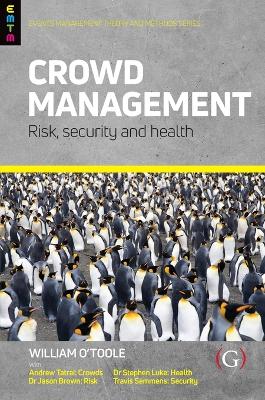Events Management and Methods
1 total work
This is the first text to present a system for crowd management which integrates security with the other concerns for the health and safety for crowds, looking at the theories and practices of the management processes, plans, monitoring and evaluation of crowds. The management of crowds in events and festivals is extremely complex as such situations are unpredictable. Whilst traditional planning is initially used, a fixed plan only works when the crowd is compliant. Every event management team now needs to understand the complexity, the decisions under uncertainty and the long tail risks in order to successfully plan and maintain optimum crowd safety.
Structured into four sections (Risk, Management, Security and Health) with templates, explanation points and case studies throughout, each of the sections is written by experts who have global experience in their field of excellence.
By William O’Toole, Events Management Specialist, Sydney, Australia with Dr Stephen Luke (Health) Senior Registrar, Team Rubicon Australia College of Intensive Care Medicine, Australia, Peter Ashwin (Security) Principal, Event Risk Management Solutions LLC, Idaho, USA, Dr Jason Brown (Risk) National Security Director, Thales Australia & New Zealand, and Andrew Tatrai (Crowds) Chairman (Non-Executive Director), Australian Concert and Entertainment Security
The Events Management Theory and Methods Series examines the extent to which mainstream theory is being employed to develop event-specific theory, and to influence the very core practices of event management and event tourism. Each compact volume contains overviews of mainstream management theories and methods, examples from the events literature, case studies, and guidance on all aspects of planned-event management. They introduce the theory, show how it is being used in the events sector through a literature review, incorporate examples and case studies written by researchers and/or practitioners, and contain methods that can be used effectively in the real world. Series editor: Donald Getz.
With online resource material, this mix-and-match collection is ideal for lecturers who need theoretical foundations and case studies for their classes, by students in need of reference works, by professionals wanting increased understanding alongside practical methods, and by agencies or associations that want their members and stakeholders to have access to a library of valuable resources.
Structured into four sections (Risk, Management, Security and Health) with templates, explanation points and case studies throughout, each of the sections is written by experts who have global experience in their field of excellence.
By William O’Toole, Events Management Specialist, Sydney, Australia with Dr Stephen Luke (Health) Senior Registrar, Team Rubicon Australia College of Intensive Care Medicine, Australia, Peter Ashwin (Security) Principal, Event Risk Management Solutions LLC, Idaho, USA, Dr Jason Brown (Risk) National Security Director, Thales Australia & New Zealand, and Andrew Tatrai (Crowds) Chairman (Non-Executive Director), Australian Concert and Entertainment Security
The Events Management Theory and Methods Series examines the extent to which mainstream theory is being employed to develop event-specific theory, and to influence the very core practices of event management and event tourism. Each compact volume contains overviews of mainstream management theories and methods, examples from the events literature, case studies, and guidance on all aspects of planned-event management. They introduce the theory, show how it is being used in the events sector through a literature review, incorporate examples and case studies written by researchers and/or practitioners, and contain methods that can be used effectively in the real world. Series editor: Donald Getz.
With online resource material, this mix-and-match collection is ideal for lecturers who need theoretical foundations and case studies for their classes, by students in need of reference works, by professionals wanting increased understanding alongside practical methods, and by agencies or associations that want their members and stakeholders to have access to a library of valuable resources.
